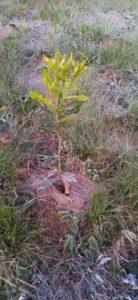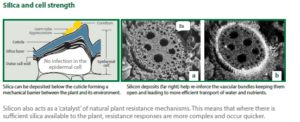2020 was one of the coldest winters on record. Severe frost was experienced in traditionally ‘non-frost’ or borderline areas with several sad stories being relayed on tree losses in Mpumalanga, KZN and Limpopo regions.
Back to Basics
Macadamia trees are native to Australia (particularly New South Wales and Queensland) which is a subtropical forest region. As such, Macadamia’s are best suited to a coastal subtropical climate.
It is critical to note that most South Africa plantings fall outside the preferred climatic environments for ideal macadamia production. This makes trees (and especially newly, planted young trees) more susceptible to stress factors such as Phytophthora, temperature, frost, wind, drought, altitude, pests, diseases and soil health.
Help your tree to help itself…
Growers with trees in high altitude regions, and those experiencing low temperatures should focus on boosting overall plant health. The trees capacity to be resilient and resist the effects of biotic and abiotic stress depends heavily on its underlying root and soil health.
Plants have an immune system and a natural ability to defend themselves. Healthy plant environments, particularly those with a proliferation of beneficial microbes have been scientifically proven to activate and enhance this ability and is referred to as Induced Systemmic Resistance (ISR).
ISR is commonly included as a ‘mode-of-action’ in biological pest control solutions ie. Bacillus amyloliquefaciens, a beneficial bacteria used in biofungicides activates a signalling pathway within the plant heightening the plants immune response and thereby making it better able to fight off disease.
A macadamia tree with Phytophthora for example stands little chance against frost. Using beneficial fungi (Trichoderma asperellum) and bacteria (Bacillus amyloliquefaciens) builds resilience which supports tree growth, ensuring up-take of water and nutrients at the correct time and the correct form, through the development of a strong root system.

Young trees are particularly susceptible to frost damage. This tree is planted outside Cedara, an area common to frost.
Mechanical strengthening – Improve stress tolerance and induce resistance
Silica builds resilience and resistance into plants by hardening the outer cell walls of the plant, from the roots through to the top of the tree. 70% of soils in South Africa are deficient in Silica (Si) and in particular former sugarcane lands, where sugarcane removes up to 300 kg Si/ha/year.
Silica has a direct impact on cell strength. Silica deposits onto plant cell cuticles, forming a mechanical barrier between the plant and the environment. It also re-inforces the vascular bundles, keeping them open and leading to more efficient transport of water and nutrients. (Typically, once frosted it is the breakdown of these vascular pathways that causes irreparable damage).
Monthly silica applications are recommended where any stress event is the primary concern ie. cold tolerance.
AgriSil K50 is an extremely soluble liquid plant available form of silica. Silica is efficiently available at comparatively low application rates.

Silica also acts as a ‘catalyst’ of natural plant resistance mechanisms ie. It triggers ISR. This means that where there is sufficient silica available to the plant, resistance responses are more complex and occur quicker.
Madumbi’s Root Health Program
The key to developing resilient trees is to provide a healthy soil and soil structure that facilitates new root development. Organic matter and beneficial microbes have a significant role to play and are critical to promoting root health and plant resilience.
Healthy root systems provide a strong foundation for future tree health and production, ultimately leading to increased income.
The Madumbi Root Health program combines increased growth promoting microbes with nutritional support to optimise root health and development, nutrient update and disease suppression. This holistic, integrated approach induces the plants inherent resistance mechanism known as Induced Systemic Resistance (ISR).
In summary, Madumbi’s Root Health program aims to BUILD RESILIENCE IN TREES.
For more information contact Madumbi.
www.madumbi.co.za
https://www.facebook.com/MadumbiSA/
https://www.linkedin.com/company/51695728

